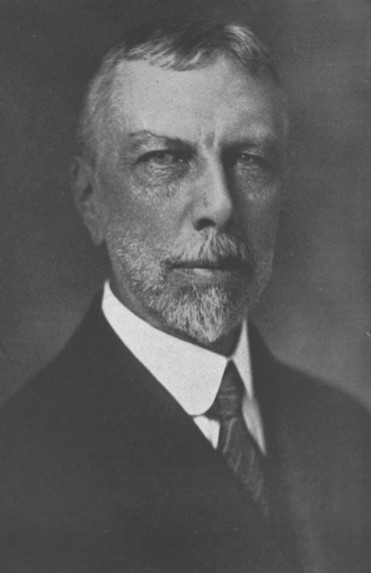| Profile | Major Works | Resources |
Arthur Twining Hadley, 1856-1930.


American "new generation" historicist/apologist at Yale.
Born into an academic family, Arthur Twining Hadley finished his undergraduate work under William Graham Sumner at Yale in 1872 before departing for Germany to undertake graduate work under Adolph Wagner at Berlin. However impressed he was by the German Historicist method, Hadley was not impressed by the state socialist leanings of his German professors. From the beginning to the end, Hadley was a proponent of dogmatic laissez-faire.
Arthur T. Hadley returned to the United States in 1879. Upon his arrival, he was appointed as a lecturer in Greek at Yale in 1878. He began teaching economics topics (notably railway administration) in 1883. However, failing to get a more permanent salaried appointment, Hadley resigned from Yale and tried to work as a free-lance writer and tutor.
In 1885, Hadley finished his painstaking study of railroads, a masterpiece much influenced by his German background. It made him an instant authority on the subject, and Hadley was employed on economic commissions by the state government of Connecticut. Impressed by his book, the Yale professor H.W. Farnam lent his political and financial support to have Hadley appointed a professor of political science at Yale in 1886.
In 1891, upon Sumner's departure for a two-year leave, Arthur Hadley was quickly made professor of political economy at Yale and placed in charge of social sciences. In 1892, Hadley was appointed as the first dean of Yale's Graduate School of Arts in Sciences. In 1899, Arthur T. Hadley became the President of Yale, a post which he would hold until his retirement in 1921.
Arthur T. Hadley evolved into the quintessential American apologist, . Hadley's highly influential textbook (1896) used economics as pure apologetics for gilded age American capitalist institutions. Like his master Sumner, Hadley absorbed the "Social Darwinism" of Spencer, and defended the monopolistic trusts as the "outcome" of the struggle of the fittest. By economies of scale, Hadley argued, large firms are more capable of absorbing losses during price declines in the course of a cycle. In this manner, "natural selection" would gradually weed out inefficient small firms. The laws of economics had thus deemed that there was an "inherent" tendency towards concentration and monopoly. As a result, Hadley regarded all kinds of government regulations to enforce competition as ultimately fruitless. The best thing that can be hoped for, Hadley contended, is that the managers of these monopolistic corporations will realize they are in a position of public trust and refrain from abusing their market power. But how? The very threat of socialist revolt, Hadley argued, would "weed out" the more rapacious and socially unfit captains of industry. The "best" and most "responsible" men will ultimately rise to the top.
Perhaps it is no surprise that Hadley was precisely the kind of economist that Veblen and the Institutionalists loved to hate!
|
Major Works of Arthur T. Hadley
|
|
HET
|
|
Resources on A.T. Hadley
|
All rights reserved, Gonšalo L. Fonseca
